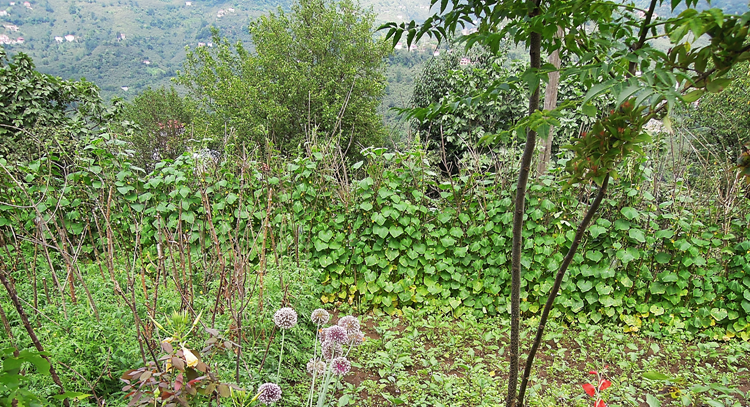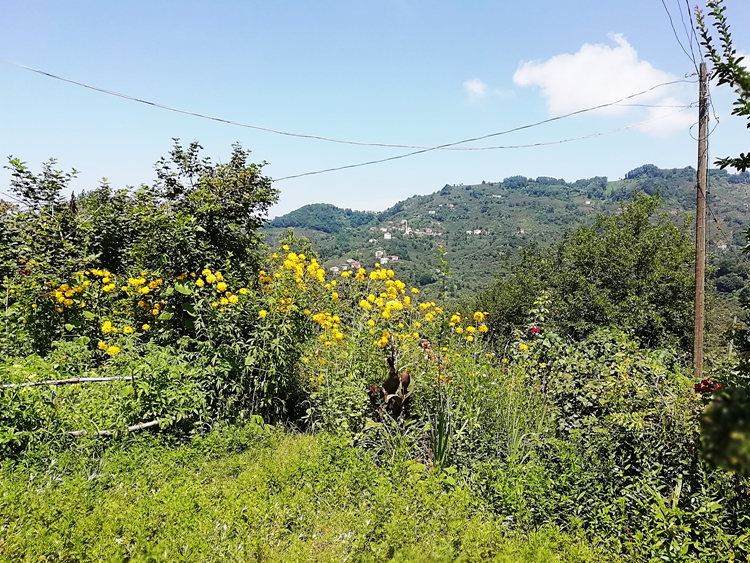sofra
Arapça sufre / Arabic sufre
1. isim Masa, sini vb. şeylerin, yemek yemek üzere hazırlanmış durumu:
“Yemek vakti gelmiş, misafirler sofraya oturmuşlardı.” – Reşat Nuri Güntekin
noun Things like table, tray, etc., situation prepared to eat food:
“Dinner time came, the guests sat at the sofra.” – Reşat Nuri Güntekin
2. isim Birlikte yemek yiyenlerin tümü:
Bizim sofra çok şendir.
noun All of those dining together:
Our sofra is very cheerful.
3. isim Genellikle tekerlek biçiminde, üzerinde yemek de yenebilen ayaklı hamur tahtası:
“Bir gün sofra masasının altına saklanmıştım da beni bir türlü bulamamıştın.” – Yakup Kadri Karaosmanoğlu
noun Generally round-shaped, board for rolling dough on legs, on which food can be eaten:
“One day I hid under the sofra and they couldn’t find me at all.” – Yakup Kadri Karaosmanoğlu
Türk Dil Kurumu Sözluk/ Turkish Language Institute Dictionary
Place
We sit on the roof of a shed that forms a landing outside the door of a small four-room house. It used to be home to my parents in law Anne and Baba, and Baba’s parents and a growing family before they moved down to the town for the children’s education. The hazelnut harvest is the only time when people stay in the old house anymore. The flowers in the garden reach up, resisting the downhill slope. The grass in front of the house is separated from the vegetables by a wall of flowers, red trumpets, pink roses, yellow flowers that only open in the evenings, magnolia, mimosa and a host of others whose provenance is based on where they came from, who grew them and when they were first seen. The sugar snap peas have passed, leaving beans, cucumbers, aubergines, peppers and tomatoes. There are potatoes to the side below the house, black cabbage in the shade beneath the far shed, a vine clambers over a pear tree grown for the leaves. The brown-green of the hazelnuts mantle the hillside, broken by plum, pear, cherry, apple, fig and mulberry trees stretching above them into the light.
The nearest house is just a few meters away but hidden by the vibrant growth all around. As the roads have spread, the houses come clinging onto the narrowest ledges carved out of the damp hill. Now they line up parallel to the contours of the slope where once they followed the ridge lines, avoiding the boggy ground where springs run and rains cause torrents. On the opposite ridge is the village where my mother-in-law was born, a place she thought she’d never see again when she crossed the valley as a young bride.

Things
A small round wooden table about 15 cm high, the sofra. A large tray, sini, copper plated with tin a meter across placed on top of the sofra. Plastic stools, mats, cushions to sit on. Metal bowls, assorted forks and spoons but never knives, glasses for tea, miniature versions of water glasses. The proper tea set is only taken from the dresser in the bedroom on the best occasions, delicate tulip-shaped glasses on copper-coloured saucers.
Food
Kofte prepared fresh in the morning at home before coming to the village. Potatoes dug straight from the garden and boiled in a round bottomed pot for salad. Tavuk “chicken” mushrooms, picked by my brother-in-law who still knows the best spots for them even if he only comes to the village once a year, washed repeatedly in spring water and fried with onions. Fried vegetables from the garden, aubergines, peppers, beans, potato. A salad of fresh cucumbers and tomatoes, onion, lemon juice and olive oil. Vine leaves stuffed with meat and rice. Sugar snap peas dipped in corn flour and fried. Pickled cherries cooked with tomato. Dible, finely chopped black cabbage, rice and onions cooked in steam with melted butter, pepper and salt poured over after cooking. Pekmez, mulberry molasses, made by repeatedly boiling and straining mulberries over an open fire for hours, topped with clotted cream. Fruit picked from any tree you care to climb. Tea from the westernmost tea factory in Turkey.
Diners
Since my first visit as a potential bride, shy, unable to speak the language, incredulous at the food and warmth, the setting remains timeless. Every few years we arrive accompanied by change; a pregnancy, a baby, another, children growing taller, faces more lined, more grey hair. The nieces and nephews grow up, disappear into their own lives and then return with their own children. The vegetable patch grows smaller, more unruly as Anne’s knees play up and Baba slows down. Their everyday visits reduce to once every few days and they lament the lack of help to work the land.
But when we all arrive, we gather round the sofra together again.
Catherine Yiğit is a writer and translator who lives in northwestern Turkey near the mythical city of Troy. Born and raised in Dublin, Ireland, she arrived in Turkey in 2001 having circumnavigated the globe. She’s interested in the intersection of real and imagined history within the landscape, inspired by the footprints of people who have crossed the Dardanelles. She works translating primarily academic papers and articles from Turkish to English, and occasionally blogs at www.skaiangates.com.


So very beautiful. Superb writing that brings us present to the lineage of growing food, of family love and growth. I feel really present. And slightly envious and very hungry! !